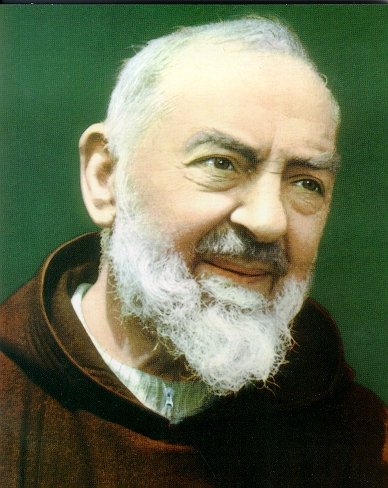[Interview] Sex therapist Dae Sheridan.
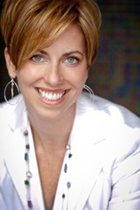 A couple summers ago, I yelled “gonads!” across a classroom of laughing grad students. We wiped tears and covered red faces while during the first session of our human sexuality class, we shouted all the sex words we knew. Our professor – sex therapist Dae Sheridan – made a list of them on the board.
A couple summers ago, I yelled “gonads!” across a classroom of laughing grad students. We wiped tears and covered red faces while during the first session of our human sexuality class, we shouted all the sex words we knew. Our professor – sex therapist Dae Sheridan – made a list of them on the board.
If we can get used to the words a person might associate with sex, she said, we can become counselors who can keep straight faces while the clients across from us use them.
The class, as it turned out, is among the best I ever took. Dr. Dae – who is brilliant and one of my mentors – agreed to talk with me about saving sex for marriage. Grateful!
AS: Rumor has it “nobody saves sex for marriage.” Is that true?
Dr. Dae: I absolutely don’t think that no one does! There might not be as high of a percentage of people who are waiting until marriage, (but) I do see an increase in people who are waiting to be in loving, committed relationships. Sex is everywhere, to sell everything, so its perceived that everybody’s doing it, but not really everybody is doing it.
AS: Are there advantages to saving sex for marriage? (If so, what are they?)
Dr. Dae: Having that trust in each other, that commitment, is huge. It creates that sense of being on the same page, being this person’s partner and teammate. If you’re talking about (saving sex until marriage), you’re obviously talking about it. You (potentially) have a working, healthy vocabulary about sexual matters. So many people are doing “it” but not talking about it. In our culture, we have a stigma still associated with talking openly about sexual matters. People don’t have really solid sexuality education, they don’t feel at ease discussing sexuality or sexual matters but they’re engaging in sexual activity. It’s crucial to be able to talk about your needs, concerns, and desires with your partner in order to have a happy, healthy, exciting, fun, mutually agreeable sex life.
AS: Have you had clients who’ve saved sex for marriage (and generally speaking, what’s the most common reason a couple that saved sex might make an appointment with a sex therapist)?
Dr. Dae: Absolutely. That’s quite common in my office. The (first of the) top two reasons is the mechanics of sex. They feel like they’re just not getting it right. How your bodies may work sexually (is) newfound knowledge. It’s about practicing new skills. The second thing is messages you may have about sex. For so long, this is a thing you were not going to do. For many there is a negative connotation, that sex is bad, sex is dirty. All of a sudden, you’re supposed to do this with the love of your life, it’s supposed to be the most wonderful thing. A lot of my clients struggle with the letting go. People who save sex are more likely to talk about it, but some of them leave it at “we’re not going to do this.” The ones who don’t talk about it because they’re embarrassed or feel guilty or there’s shame involved have a much harder time learning about their bodies, sharing with their partner.
Working with those couples (is) one of the most fun cases because they are so open to it, they’re ready to learn, they are committed to it, and they’re finally giving themselves that permission. (It’s) teaching them the ropes, giving them resources and ways they can look at this in a different way and have some fun with it and feel good about themselves and their choice. I reiterate what a great choice (it was) and how wonderful (waiting) was for them. Now it’s about working with the couple to find out what they want their sexual relationship to look like. My job, too, is talking to them about finding ways to enjoy it now that they’re doing it.
AS: What would you say to somebody who waited and is concerned that what happened on the wedding night didn’t look or feel like the media says it should?
Dr. Dae: I educate my clients (about) what real sex looks like. It’s different for everybody, and every body. It almost never looks like it does in the movies. This is a fantasy you have been sold. All of that is a less safe way to have sex. Whether it is TV, movies, or pornography, real sex doesn’t look like that all the time, especially not the first time, ever.
AS: What should everybody who waits know before the wedding night?
Dr. Dae: Of course it’s something to look forward to and be excited about, but so many people don’t express that they’re nervous. It’s like, “I can’t wait!” but they’re really shaking in their boots. Meanwhile, the other person is thinking the same exact thing. How can you not be nervous about that? People do have nerves and worries about “Will it really be OK? Will I be able to give of myself in this way openly, and how’s it going to go physically? Will they like the way I look?” It’s really important to communicate honestly about your hopes, your expectations, and your fears. Talk to each other, lower your expectations for the first time, and if you are struggling with it, be open to talking to someone, whether it’s (about) mechanics or logistics or anatomy or pleasure. Like any skill, we have to practice to obtain mastery of this skill. There’s going to be that awkward time, and it’s not going to be choreographed. Just have fun knowing your bodies are going to make all sorts of noises. You may or may not get it right.
In church, they talk about (wedding night sex) being amazing. (But) it won’t be this magical firework display that we’re told it will be. It wont be amazing the very first time just because it’s your very first time. It really is unbelievably rare for a first time to be like that. (What’s amazing is that) you took that much time caring for yourself, and not just going willy nilly because everybody’s doing it. That you’ve made a commitment to yourself, to God, and to your partner, that you’re going to follow the tenets that are put forth. It is difficult in this day and age, with the pressures and the feeling that everyone’s doing it. You are holding yourself to a higher standard and that is to be commended.
– – – –
Dr. Dae is a licensed psychotherapist, board certified clinical sexologist, and certified rehabilitation counselor. She has been a sex educator since 1996, a therapist for 16 years, and a sex therapist since 2002. She is an adjunct professor at the University of South Florida and an assistant clinical professor at the American Academy of Clinical Sexology. Visit her online at DrDae.com.
[Interview] Sex-free screenwriter, director, and author Monique Matthews.
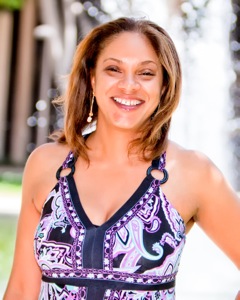 Late last year, I stood in front of a mic in a Tampa recording studio where, through headphones, I listened to Monique Matthews talk sex from a studio across the country.
Late last year, I stood in front of a mic in a Tampa recording studio where, through headphones, I listened to Monique Matthews talk sex from a studio across the country.
She and I were two of three ladies invited as guests for a segment on NPR’s nationally syndicated Tell Me More to chat about our choices to save sex.
Matthews – screenwriter, director, and author of the book Sex Free: A (not so) Modern Approach to Dating and Relationships – is from New York City, lives in Los Angeles, and has worked in entertainment journalism and as managing editor for a national hip-hop publication.
Matthews, who hasn’t always practiced abstinence, is excited to celebrate her eighth year of celibacy this month. She recently graciously agreed to chat more with me about her choice to abstain from sex:
AS: Are you religious (and is your decision to practice abstinence at all rooted in your religious beliefs)?
MM: I am a practicing Christian who realizes that God’s commands are not to hurt, but to strengthen me, shield me from any harm, and enable me to enjoy life in abundance.
AS: How has life changed for you since making the decision to practice abstinence?
MM: Being sex free has impacted my life in many ways, big and small. One of the ways my sex free lifestyle has impacted me most is by strengthening my discernment skills. More specifically, eliminating sex allows me to see the depths of my attraction to someone. If it’s a largely sexual attraction, I know to let the potential interaction go. If it’s more than that, I do my best to be present and “show up” as the relationship unfolds.
Another way that being sex free has helped me is that it has increased my self confidence. I am valuable. Sharing my heart, time, and values with someone else is more than enough. If he doesn’t feel this way, then he’s missed out on a really great opportunity to know someone who’s fun, intelligent, resourceful, and willing to go to Hades and back for someone I love.
Finally, and most importantly, it has strengthened my walk with God. I can talk to Him about anything, including being horny. He knows his child. He knows how to strengthen me, so that I can put the flesh to rest, when it’s warring against me and wanting me to do nothing but feed it. I also know that I don’t have to hide anything from Him, for He cares for me. And, more and more each and every day, I see His faithfulness.
AS: When we were on NPR’s Tell Me More together, you talked about working in industries that aren’t conducive to saving sex, like screenwriting and entertainment journalism. Why exactly is it difficult to be “sex free” if a person is part of those industries?
MM: I am a screenwriter and director. Prior to that I was a magazine editor for a music magazine. As such I’ve worked primarily in areas where “sex sells.” Most popular music insists that having sex, often as much as possible, is not only fun and enjoyable, it is often a key to a woman’s equality. By this I mean that women are often considered equal to a man if they have casual sex without developing emotional attachments. Being risque is often associated with being sexy, as the listing of weekly Pop Top 20 charts will confirm. As a student in film school, many guest speakers would tell us the litmus test of deciding whether someone had “made it,” namely, “Women want to be like you and men want to f@#k you.” This does not mean that you have to sleep with every and anyone to be accepted; it suggests that one remember to use her sexuality as a tool, in addition to other talents, including writing, directing and producing.
AS: How do you manage to be “sex free” in your industry?
MM: Everything starts with a decision. Once you decide what you will and won’t do, you learn how to exist and thrive in any given setting.
AS: Regardless of the industries in which we work, we live in a culture in which being “sex-free” isn’t the norm. How can people who want to practice abstinence practice it regardless of what the world around them says?
MM: The first and most important reason is to decide what abstinence means for you. I believe sex, in its essence, is a fun, exciting and wonderful way to connect with another human being. If one chooses a sex-free lifestyle, the length of time is often based on that person. For some, particularly those guided by strong religious beliefs, it is until they are in a covenant relationship. For others who need healing from past relationships and/or may be in pursuit of a goal, it may be for a season until they can get a handle on whatever is preventing them from having fulfilling relationships and/or lives. It largely depends on the individual. Though I am a believer, I do not believe that the benefits of being sex free, which includes increased discernment, confidence, discipline, patience, and learning non-sexually based ways to show love, concern and consideration for a partner should be contained to the Christian community. Just as it’s widely agreed upon in society, whether one follows the Judeo-Christian tradition or not, that the Ten Commandments are a “good idea,” being sex free can work for anyone, regardless of religious affiliation or lack thereof.
AS: Is there anything I didn’t ask about, that you’d like to add about sex, abstinence, or relationships?
MM: One’s decision to become sex free, for whatever length of time one decides, is not easy, but it is worth it. Understand that tough days and nights will come. Do not run away from them nor deny them. Instead, allow them to strengthen you. As Romans 5: 3 – 4 encourages, “We can rejoice, too, when we run into problems and trials, for we know that they help us develop endurance. And endurance develops strength of character, and character strengthens our confident hope of salvation (NLT).”
– – – –
Sex Free: A (no so) Modern Approach to Dating and Relationhips is available in paperback for $9.99 and as a digital download for $5.99 at Amazon.com. Special autographed paperbacks are available for $9.99 at sexfreebook.com.
Click here to like Matthews’s book on Facebook.
Click here to follow Matthews on Twitter.
Click here to listen to Matthews, Lisa Marziali, and me on NPR’s Tell Me More.
[Interview] St. Padre Pio’s secretary, Fr. John Aurilia.
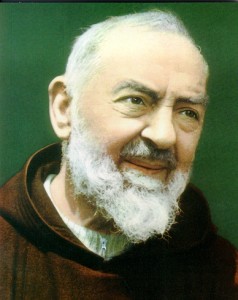 |
| St. Padre Pio (Source) |
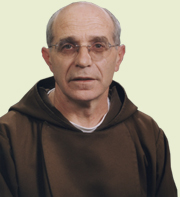 |
| Fr. John Aurilia (Source) |
On August 31 in 2009, I followed a Capuchin friar from the chapel at Most Holy Redeemer Catholic Church in Tampa to his desk in his office next door. Fr. John Aurilia, then Most Holy Redeemer’s pastor, agreed to let me interview him for a story.
I dove right in with questions: What vows does a friar take? Why did you become a priest? What exactly do you own (not much!), and do you really live in poverty? Fr. John answered with humility and an Italian accent. He shared his story, eventually divulging what I never expected he would:
“In 1967, I was called to be Padre Pio’s secretary,” he said.
“I’m sorry,” I said, certain I had misheard him. “Whose secretary? I thought you said Padre Pio…”
As it turns out, he did.
Fr. John was ordained a priest in Campobasso, Italy by Bishop Alberto Carinci on Dec. 17, 1966. In 1967, for the month of August, he served as St. Padre Pio’s temporary secretary. Padre Pio was a friar known for receiving the stigmata (wounds like Christ’s); for bilocation (yes, being in two places at once); and for miraculously knowing stuff that nobody told him. Padre Pio died in 1968 and was canonized a saint by the Catholic Church in 2002. Now, Fr. John is pastor of Our Lady of Mt. Carmel Church in Passaic, N.J. He and I have kept in touch since I interviewed him for the paper, and he was gracious to chat with me about Padre Pio:
AS: Did you know, or had you met Padre Pio before you served as his secretary?
Fr. John: Yes, when we were in the Minor Seminary in Pietrelcina, about 40 miles from San Giovanni Rotondo, we used to visit Padre Pio very frequently to get his blessings. For about 10 years before I became his personal secretary, there was a constant contact with Padre Pio. Then, I was requested to substitute (for) his personal secretary for a month.
AS: What did you know about Padre Pio before you worked with him?
Fr. John: That he was a saintly Friar, that he performed miracles, he had the stigmata, and the gift of knowing hearts and minds, and the gift of bilocation.
AS: Where did you and Padre Pio work and live?
Fr. John: The office where I worked was on the third floor of the friary. I was sleeping on the second floor, where the others friars were sleeping (including Padre Pio). There were at that time about 15 friars living in the friary. The dining room was on the first floor. The friary was attached to the church, so that the friars could go to the church without going outside. In front of the church and the friary there is a big plaza to accommodate the crowds, and access public transportation to the city. The Hospital Casa Sollievo della Sofferenza is located about 500 feet from the church. The friary has a secluded garden in the back, with huge trees, vegetable garden, flowers, big enough to take a good walk through the many walkways. At my time, the whole place was always very busy as it is now…even more! The town of St. Giovanni Rotondo originally was not connected with our friary and church, as it is now. When Padre Pio was a young priest stationed in San Giovanni Rotondo (in the 1920s-40s) the friary was not accessible by public transportation. It was only accessible by walking or riding a mule or donkey. It was located on top of the hill.
AS: What did you discover about Padre Pio by being his personal secretary?
Fr. John: I did not discover anything new from what I knew before, except that his best gift was the gift of humility, because, although people were coming to him by the thousands, he was always humble, and never changed his daily schedule: many hours of prayer, many hours of confessions, and a long mass (more than an hour).
AS: When I think of St. Padre Pio, I think of the stigmata, and of a prayer of his that I frequently pray. What do you think of when you think of Padre Pio?
Fr. John: I think of a regular human being, who happened to be very saintly, by the grace of God. He always kept his smile, in spite the many sufferings. I also think of Padre Pio as a humble, pleasant, and prayerful person.
AS: My favorite St. Padre Pio quote is the popular and powerful “Pray, hope, and don’t worry.” While you worked with him, what – if anything – did Padre Pio say to you personally that enriched your life like “Pray, hope, and don’t worry” enriches mine?
Fr. John: He spoke to me without words. He spoke to me very eloquently and powerfully with his way of life (constant prayer and suffering). I do remember that he told me something really insightful about prayer: “John, prayer is the key which opens the doors of heaven.”
AS: Did you witness firsthand the stigmata, bilocation, or other miracles?
Fr. John: Yes, I saw the stigmata many times, when he did not have on the half-gloves. I never experienced bilocation and other miracles, but I do know they are true because the people who were affected by (it) told me first hand. I once experienced something unusual. I did not know how to answer to a lady who was asking (in a letter to Padre Pio) if (her) son (should) be a doctor or a priest. So, I went to Padre Pio (to ask) how to answer. Padre Pio never saw the letter, which I had in my hands, and before I started asking, he promptly said: “Tell her the son is going to be a good doctor.” I was shocked!
AS: In what way is your spirituality or priesthood influenced by St. Pio?
Fr. John: After living with him, I understood that my priesthood is not mine, it belongs to Jesus. I am only an unworthy instrument. I also believe that prayer and humility are the greatest strengths I find in my religious life.
AS: Do you frequently ask St. Pio to intercede for intentions in prayer?
Fr. John: Yes. I ask him every day, sometimes more than once a day.
AS: Why would you recommend we ask St. Pio to intercede for us?
Fr. John: Because I know him, I spoke to him, I touched him, I love him.
AS: How did St. Pio’s death and canonization impact you?
Fr. John: The death and canonization impacted me in a way that my life was never the same ever since: a new look at religious life, more positive about goals to achieve and virtues to pursue.
AS: What, ultimately, did you learn about God and/or life by working with Padre Pio?
Fr. John: I learned that God is not a judge, but a loving Father and Mother, and life is worth living, only if there is plenty of hope, faith, and love.
– – – –
Click here to read the story I wrote about Fr. John for the Times.
Click here to visit Fr. John’s church website.

